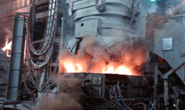Market Segment

September 20, 2021
Nucor Execs Outline Raw Materials Strategy for New Sheet Mill
Written by Michael Cowden
Nucor has enough raw material to supply its planned $2.7 billion, 3-million tpy sheet mill, but is exploring new technologies that might help it further reduce carbon emissions.
The Charlotte, N.C.-based steelmaker is eyeing a range of options – including increased use of shredded scrap in its sheet mills’ electric-arc furnaces (EAFs), “green” pig iron from Brazil, and additional scrap acquisitions.
![]() The company has since January tasked a team with evaluating promising technologies and processes around the world. The group has since identified a handful of among the more than 100 examined that could significantly reduce CO2 emissions – and Scope 3 emissions in particular, company executives said during a conference call with analysts on Monday, Sept. 20.
The company has since January tasked a team with evaluating promising technologies and processes around the world. The group has since identified a handful of among the more than 100 examined that could significantly reduce CO2 emissions – and Scope 3 emissions in particular, company executives said during a conference call with analysts on Monday, Sept. 20.
Scope 1 refers to emissions generated directly by a producer’s operations. Scope 2 refers to emissions related to the energy that powers that company. And Scope 3 includes other emissions associated with a mill’s manufacturing process – including transportation and logistics.
The Alternatives
Scope 3 is a concern for traditional pig iron sources – think Brazil, Russia and Ukraine – because of carbon intensive reduction processes and pollution associated with overseas shipping.
“There are certainly some advances in some ‘green pig’ coming out of Brazil that we’re going to stay very close to and watch,” Nucor President and CEO Leon Topalian said on the call.
He also noted that he was familiar with alternative pig iron technologies given his past involvement with HiSmelt, a pig iron joint venture among Nucor, iron ore miner Rio Tinto and others.
Nucor will in the meantime take advantage of its own significant scrap holdings and the 4.5 million tons of annual direct-reduced iron (DRI) production capacity already under its belt.
“We feel we can easily supply into that area, to that plant, the DRI needed from a quality perspective,” said Rex Query, Nucor’s executive vice president of sheet and tubular products.
Nucor operates DRI plants in Louisiana as well as in Trinidad and Tobago. Its scrap holdings include The David J. Joseph Co. (DJJ), one of the largest scrap processors and brokers in the U.S., which it acquired for $1.44 billion in March 2008.
When it comes to DRI, Nucor can “rationalize” its consumption and earmark the scrap alternative only for plants, such as sheet mills, that require it from a quality perspective, Query said.
And on the scrap side, the DJJ team already has technologies – and is eyeing new ones – that would allow it to reduce the copper content in shredded scrap so that the feedstock could be used more widely in Nucor’s EAF sheet mills, company executives said.
Copper can make steel brittle and more prone to crack when put through the automotive stamping process. That’s why sheet mills typically rely on prime scrap, which has fewer impurities, or virgin metallics such as DRI and pig iron.
And additional acquisitions in scrap might be in the cards, although any scrap M&A won’t be aimed at simply adding more tons. “As we announce future things that we may do in scrap acquisitions … it’s very targeted at regions where we want to have a presence – and a strong presence,” Nucor Chief Financial Officer James Frias said.
The Price
One thing that raw materials sourcing – and the cost structure of the mill itself – won’t be based on is current steel and scrap prices, company executives said.
“Scrap prices and steel prices tend to move together,” Frias said. “We know that today’s market is not going to exist forever.”
Prime scrap prices fell approximately $40-50 per gross ton this month, and hot-rolled coil prices last week slipped a modest $5 per ton. Still, the dip represented the first for HRC in more than a year.
Company executives declined to specify the anticipated metals margins at the new mill, but said they would be roughly in line with those of other modern EAF sheet mills.
Metal margins are the difference between input costs – think scrap, pig iron and DRI – and finished steel selling prices.
“From a pricing standpoint … we absolutely did not look at the recent runup in that last year and a half and what’s current in the marketplace,” Frias said. “Is that a new normal or near a new normal? We have no idea. So we looked at historical averages – a balance of lower market times and better market times – and used that.”
Hot-rolled coil prices were at $1,950 per ton ($97.50 per hundredweight) when this article was filed on Monday afternoon, more than triple $580 per ton in September 2020 and 82% higher than a prior peak of $1,070 per ton recorded in the summer of 2008. Prime scrap prices, meanwhile, were at $590 per gross ton, nearly double $300 per gross ton in September of last year.
The pricing data above come from SMU’s interactive pricing tool, which you can find by clicking here.
By Michael Cowden, Michael@SteelMarketUpdate.com







